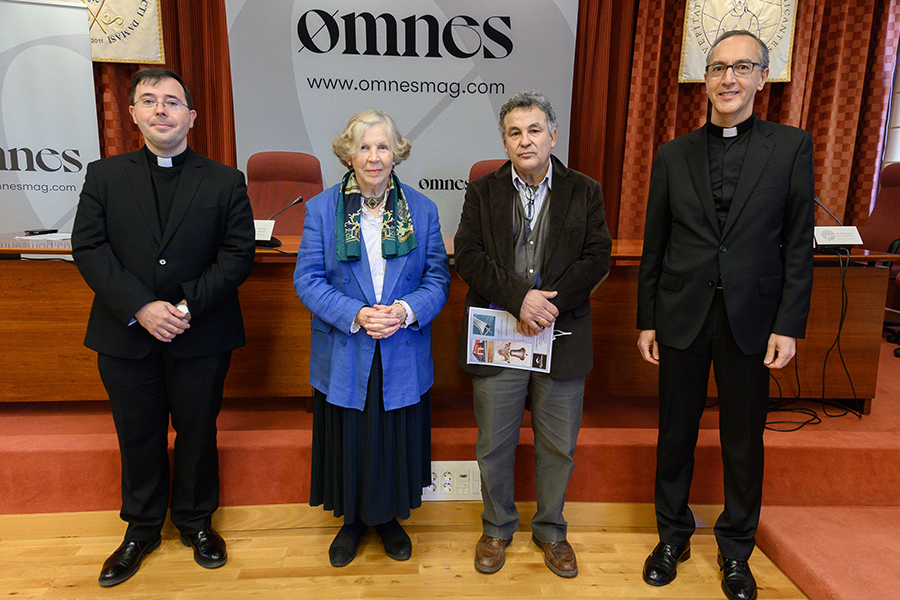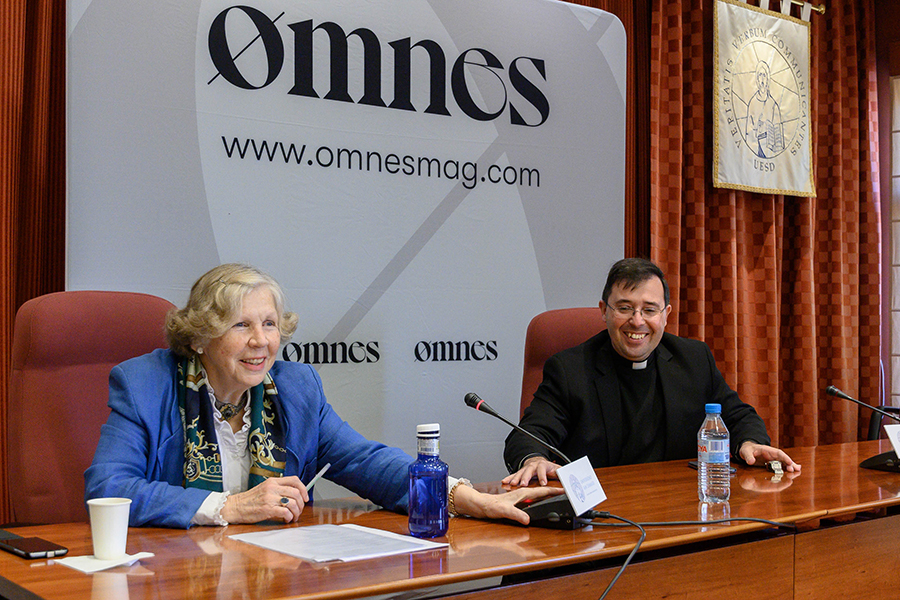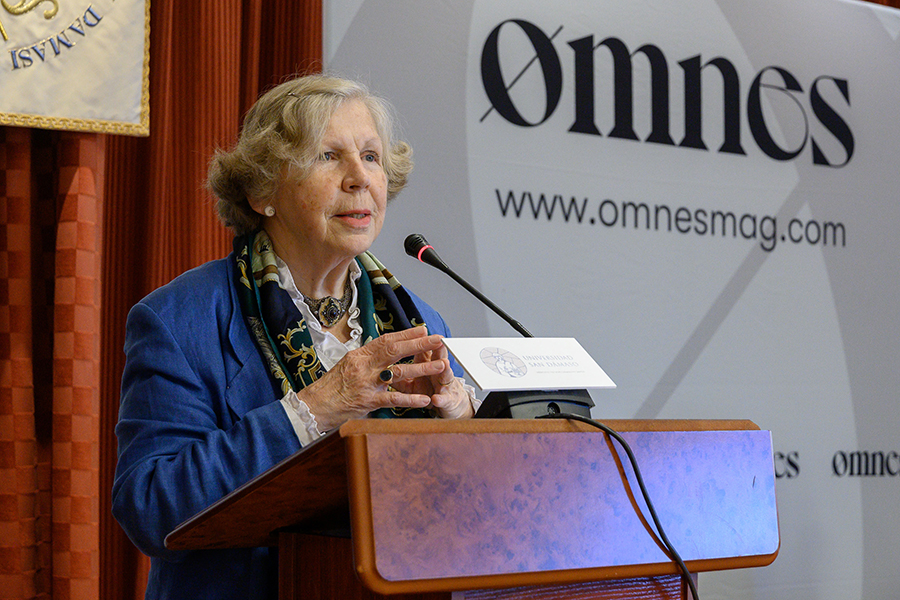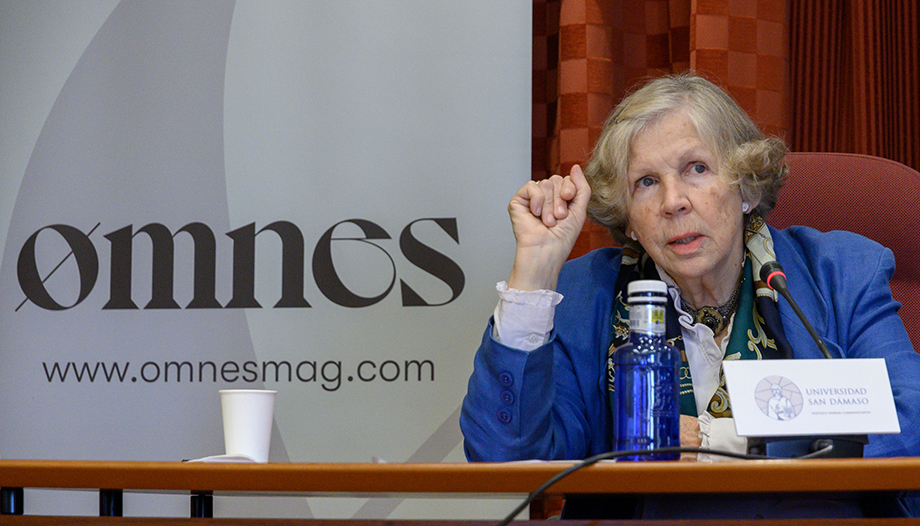– Supernatural conference had aroused expectations for several reasons. First of all, the German philosopher had just received in Rome, from the hands of Pope Francis, the 2021 prize of the Vatican Foundation Joseph Ratzinger - Benedict XVI, together with her compatriot, Ludger Schwienhorst-Schönberger, professor of Old Testament at the University of Vienna.
Secondly, the Synodal Path is taking place in Germany, which will last at least until 2023, and is the cause of philosophical and moral controversies, as Omnes has been reflecting in various chronicles and information. This synodal journey has sometimes been based on a separation between nature and person, which would justify a reform of sexual ethics and morality in the Catholic Church that some are proposing.
The philosopher Hanna-Barbara Gerl-Falcovitz (Oberwappenhöst, Germany, 1945) alluded to this in her lecture at the University San Dámaso, whose title was 'Body, love, pleasure. Where does the separation between nature and person lead?'
You can read the full conference hereí
A complicated time for the anthropology of sexuality
The event, which took place both in person and online, was introduced by the dean of the Faculty of Philosophy of the Universidad San Dámaso, Victor Tirado; the director of Omnes, Alfonso Riobó, and the associate professor of the Faculty of Philosophy, David Torrijos, who moderated the session and the subsequent discussion.
Dean Víctor Tirado said that "it is a pleasure personally, and for San Dámaso in general, to host this event organized by Omnes, which brings us Professor Gerl-Falcovitz, with an essential theme today, such as the nature of the human being. At a time, moreover, when anthropology is so diffuse and so shifting, and in which metaphysical reflection has almost been lost in many aspects".
For his part, the director of Omnes, Alfonso Riobó, thanked "Dean Víctor Tirado for his interest and his willingness to host us at the University San Dámaso in a very significant event", because Professor Hanna-Barbara Gerl-Falcovitz is "an outstanding philosopher, one of the great figures of current Catholic thought, who has just received the Ratzinger 2021 prize in Rome". The director of Omnes also thanked Banco Sabadell and the Roman Academic Center Foundation (CARF) for their collaboration, before giving way to Professor David Torrijos and the German lecturer. In his brief words, Professor Torrijos recalled that Edith Stein, a figure very studied by the German academic, is the patroness of the Faculty of Philosophy of the University San Dámaso.

Synodal Path in Germany
At the beginning of her speech, Professor Gerl-Falcovitz evoked a couple of anecdotes involving a German cardinal and a German bishop, whose names she omitted, and which focus on human nature, a cross-cutting concept in her speech.
"Recently, in Germany, after the Synodal Way, a cardinal (a word that translated means: 'quicio') pronounced thus at the beginning of October 2021: the affirmations about the human being belong to the "dispositional mass" of Christianity, because they are not 'de fide definita', defined about the faith, but changeable.", commented Gerl-Falcovitz.", commented Gerl-Falcovitz. "So, are we looking at a new ethics?" he wondered. "Ethics comes from. ethosIs it necessary to mark again the fence we had around sexuality?"
And she herself answered: "The surprising statements on sexuality at Forum IV (of the Synodal Way in Germany) simply want to open the fence; in fact, anyone could mark it. Do we still need it? This 'new' sexual ethic was greeted with joy by two other speakers, one of whom was a bishop; at last the step would have been taken: in love, it is not only the person with his or her individual freedom that matters. Nature - that is, the body, sex, the received disposition - are at best proposals that can be discussed or modified," warned Hanna-Barbera Gerl-Falcovitz, who is a member of the presidium of the European Institute for Philosophy and Religion at the Benedict XVI School of Philosophy and Letters in Heiligenkreuz/Vienna.
Background of the German controversy
Before continuing with her presentation, perhaps it would be useful to delve a little deeper into the context of this conference, the Synodal Way in Germany, which will allow a better understanding of her affirmations. Professor Gerl-Falcovitz did so when answering one of the questions of the colloquium.
"The sticking point [alleged by some] is that we have to separate nature from personhood, in contemporary sexual morality. Somehow we get closer in this way to people who have different conceptions of sexuality, but then somehow we leave behind whether nature can teach us anything about how to behave in the realm of sexual life or sexual morality."
Human nature
"In Freiburg there is a colleague who claims that the person has to be thought of without taking his nature into account," the German philosopher continued. "The reason he puts forward is that the person essentially consists in his freedom, which means autonomy in a very precise sense. The meaning of this autonomy is linked to Kant, although this colleague somehow departs from Kant himself, understanding that we have an autonomy, and that God imposing something on us, or saying something about our freedom, would be something foreign, alien, to us. If God is something foreign, alien, to me, that means that there is nothing He can say about my conduct without altering it in some way. In that way, God, as a heteronomous instance with respect to my freedom, has to be set aside in some way before my freedom".
According to this argument, the scholar specified, "whatever God might say by way of commandment about my own sexuality would have to be valid only to the extent that it was something rationally acceptable to me, meaningful within my own autonomy. So any divine command will be conditional on it being within my own autonomy, my own rationality."
The 2021 Ratzinger Prize winner further clarified the intellectual journey of this other person from Freiburg: "In recent times, this colleague has taken a journey starting from Kant and ending with Friedrich Nietzsche. The problem with this situation is that, in Kant's thought, autonomy is linked to rationality. So, for Kant autonomy can be shared with other people, it can be argued, it is linked to reason. But in Nietzsche's thought, autonomy is linked to will, which means that it is linked to my freedom exclusively, without somehow reason having anything to say there. My will defines my autonomy, one could say simplifying what the colleague says."
Separating nature and person: "an obsession".
The storyline was already on the table, so the lecturer wanted to go deeper from the beginning with some questions, which she answered herself.
"Does this mean that the body is only the raw material for my will? It is surprising: nature and bio-ecology are on everyone's lips lately; they must be protected, they must be nurtured, but under no circumstances can they be modified by man. Genetic engineering? No, thank you, but should we assume that nature has nothing more to say? So, an a-corporeal love? An a-natural love? No, you'll hear right away: we didn't mean that. But what, then? Let's see the spectacle of errors and confusions", the German philosopher affirmed, putting a point of caution: "Beware", she reminded, because "'obcecation of the mind is the first-born daughter of lust', says Thomas Aquinas".
In the opinion of the German professor, "the supposedly revolutionary idea is an obsession: the separation between nature and person. It is by no means very new or postmodern; on the contrary, it has been formulated a long time ago. Its deviations are also visible, and have also been criticized for a long time. And they are contradictory.
Brief historical review
For about 500 years, the Modern Age has conceived of nature as a kind of mechanical workshop, and man also functions as a natural machine among other natural machines, the German academic pointed out. "Neurobiology, the most recent discipline, reinforces in some of its representatives a very simple statement: thought is nothing more than interconnection of brain synapses. Even the objection that, if everything is determined, this applies first and foremost to the researcher himself does not bother. Something similar happens with the statement of a Nobel Prize winner in chemistry, who affirmed that man is nothing more than chemistry. With that, freedom would have been completely abdicated," he said.
"Since Judith Butler's 'Gender Trouble' in 1990, culture points to a surprising extreme: the transformation to the point of dissolution of the body in cyberspace, in virtual or also real medical-technical space," Gerl-Falcovitz noted, turning her gaze to extreme transhumanism. [...]. The 'body (Körper)' becomes a place of protest against a non-autonomously constructed identity. The utopias of fluid identity refer to the total self-design of the 'I'. ' Also sexual life is 'staged'; the 'I' wears the respective sex mask, with the result that 'this mask harbors no self' (Benhabib, 1993, 15)."

Is the man your software?
Following the thread of her reflection, the lecturer, who studied Philosophy, German Philology and Political Science at the universities of Munich and Heidelberg, and is a requested author in interventions on anthropology, pointed out: "what is in vogue is 'gender nauting', navigating between the sexes. Man is his own software, rooted beyond the body and sex. In this direction the gender debate points: it makes the biological sex ('sex') disappear in the attributed sex (cultural, social, historical - the 'gender'). Instead of determination by nature, a voluntary self-choice is offered: is woman already woman, or who 'makes' woman, woman, and man, man? Without resistance, without will, the body offers itself as a 'pre-sexual body'. The self does not know incarnation".
From the diagnosis, Gerl-Falcovitz stated his position: "Now, we need to find a common thread through these contradictions. It is this: there is no separation between nature, culture and person. More simply: there is no separation between body and sex, between love and duration, between pleasure and children. Hence the need for a critique of this nature split in half, reduced to mechanics, but also of culture split in half, read in terms of pure constructivity".
From his point of view, "man is, in reality, anchored in another place: in the direction of the divine. Human nature, and even more so culture, lives "towards". The greatness of nature ("natura") consists in the fact that it is actually called "nascitura": that which wants to be born. And it is nature that seeks the free participation of man in his "towards"; it seeks that he affirms and realizes his orientation. The creature has been created towards the origin, it carries its sign, its home is where it comes from".
"The body is gift, sex is gift."
"This can already be read in the engine of sex," he added. "It is loss of self in the other, it is the grammar of love made flesh. The body is gift, sex is gift, it is reason and origin (in German 'Ur-Sprung,' the primal leap) of that which cannot be done by us, of the passion of being man, of the enormous impulse toward self-giving."
In the scholar's view, we are "enriched by the duality of male and female, and impoverished by it; not sufficient ourselves, dependent on the attention of the other, waiting from the other for the redemption that comes from the realm of the divine and in its highest and most fruitful form leads back there (Gen 1:27ff). What in Greek thought is a 'deficiency,' the lack of unity, in biblical thought becomes the joy of duality."
In her argumentation, the lecturer underlined that "sex ('Geschlecht') can also be understood, from its literal sense, as 'being sacrificed' (in German 'Geschlachtetsein') or as 'being in half' ('Hälftigsein'). The brutality of the sex-only, of the 'river-god of blood [...] ah, oozing the unrecognizable' (Rilke, 1980) must, therefore, be humanized. It is difficult to think the body without a suggestive and different Other. But neither 'nature' (biology) nor 'culture' (self-design) is 'healed' by itself. Therefore, it is crucial to know the divine horizon, to know the guidelines that come from it. Only then can one 'act ethically', that is, 'freely correspond to the order of being' (Thomas Aquinas)," the professor points out.
Tension between nature and culture
As has been pointed out, Hanna-Barbara Gerl-Falcovitz is an outstanding specialist in the studies on Edith Stein (Wroclaw 1891-Auschwitz 1942). But also of the German Catholic theologian Romano Guardini (Verona 1885-Munich 1968), whose 'Opera Omnia' she edited, and whom she quoted in her arguments, especially in relation to nature and the person. Earlier, the philosopher wanted to reflect further on human sexuality.
"The idea of man's self-determination is not in itself wrong, nor morally evil. It is based on the strange fact - as salient as it is dangerous - that man indeed occupies a special position among other living beings, also as regards his sex." "The positive side" is that "although he does not have the stimulus-response security of an animal, he does have freedom from instinct and thus freedom towards the world and towards himself; and also the full risk of endangering others and himself."
But "at the same time," he added, "freedom constitutes the creative flank, to shape the world and the human being. The human being is a reality full of tensions, stretched between the given 'nature' and the opposite extreme of change, becoming, the future, 'culture'. [...]".
At this point he distinguished between animals and human beings. "An animal has its sex, and does not have to mold it; hence its sexuality, naturally assured, is free from modesty and, from the functional point of view, clearly oriented to offspring."
"A human being is and has his or her sexuality, and must shape it: it is not simply naturally assured, but culturally determined and imbued with modesty due to the possibility of failure; moreover, it is not necessarily linked to offspring. In sexuality there is room for achievement and failure, on the basis of the inescapable tension between the impulse (of natural need) and the self (of freedom)".
"Sexuality, a fact of nature".
In Gerl-Falkovitz's view, "embodiment in one's own body, its adaptation to one's own body, 'hospitality' towards the other sex, are the key words. It does not indicate rebellion, neutralization, leveling, or 'disregard' of the received disposition. Thus, the duality of sex is not only accessible to a cultural processing, but even points towards it. But sexuality must be cultivated as a given of nature (what else could be shaped?)."
"To cultivate means neither to submit to it nor to eliminate it. Both can be demonstrated by the two different objectives of sexuality: erotic fulfillment in the other and generative fulfillment in the child, for which, in any case, two different sexes must be presupposed.
The child belongs to the erotic justification of the human being (Fellmann, 2005). And, again, the child itself is not something neutral either, but enters into dual existence as a 'culmination' of the very act of love."
Thus, "instead of a distorted nature, therefore, nature is a datum and at the same time means 'nascitura': a becoming, an unfolding of the given disposition. The current mechanization of nature is far behind, and so is construction. With the negation of nature in man, not only does the telos of life itself become confused and opaque. The moment man abandons the consciousness of himself as nature, all the goals for which he keeps himself alive become empty [...]," he added, quoting Theodor W. Adorno.
And finally, he mentioned Guardini, whose chair was suppressed in 1939 by the Nazi regime, and who was invited to teach at the University of Tübingen in 1945, and then at the University of Munich: "What modernity calls nature is, in the last analysis, a half-reality. What it calls culture is something demonic and torn, despite all the grandeur, in which meaning is always paired with meaninglessness; creation with destruction; fecundity with death; the noble with the petty. And a whole technique of overlooking, concealing and blinding has had to be developed so that man can endure the lie and the fright of this situation." "So let us abandon the lie," the philosopher proposed.
"Self-belonging through the other."
"Person means something double: to subsist in oneself, and to transcend oneself in some direction. [...] Now then, to be a person is not a flat possession of oneself. Augustine spoke of a self-possession, of an "anima in se curvata," which collapses in on itself. Rather, it happens that I awaken in the encounter with another I, which also belongs to itself and yet comes to me," Gerl-Falcovitz continued.
"Only in the encounter is the preservation of the self, the actualization of the I, especially in love. 'He who loves is always in transit toward freedom, toward freedom from his authentic bondage, that is, from himself,' said Guardini. "Therefore, self-belonging through the other acquires a decisive, even fateful, dynamic. It results from the constitutive tension that goes from the I to the you: in transcending, in giving oneself to share, also in corporeality, and likewise in the tension toward God."
"It takes two people, two genders."
The lecturer thus arrived, with the necessary limitations of space in an information of these characteristics, at her reflection on the necessity of the duality of sexes. "But why does this not invalidate me in my own Self? Because the person in front of me must be thought of equally as subsistence and as going out beyond itself. For this, however, one needs not only two persons, but two sexes - as mutual and unfathomable strangeness, unfathomable withdrawal, even to the bodily, even to the mental, even to the spiritual; it is precisely in sexual love, which experiences the body of the other, that transcending into the otherness of the other sex takes place, and not only a narcissistic encounter with oneself.
Only in the other sex is the true difference perceived, which cannot be appropriated by me, it does not reflect myself: woman as a permanent secret for man. Who dodges this profound difference, dodges life," he said.
Body, life and love
In this sense, the challenge posed by the German philosopher was the following: "Could the ancient vision of Genesis - beyond all moral doctrines, which in the end are ineffective - that, in the daring of the two sexes, in the background of the encounter the divine dynamic unfolds, that the unprecedented life of God himself generates the play of the sexes and has created it as the image of that which surpasses all images? And that from there the opening up to the other sex expresses the divine tension, be raised again today?"
"It is no accident," the scholar pointed out, "that the German words 'Leib' (body), 'Leben' (life) and 'Liebe' (love) come from the same root. Whoever makes the body an 'allotment', an enjoyment for oneself in the other, underdetermines life. Life allows man to be grounded in himself, but at the same time continually drives him beyond himself, towards the other sex. And the extreme provocation of biblical thought goes even through death, towards a new body. The resurrection of the body, of my body, that is, as a man or as a woman, is the message of joy".

"God became man, born of a woman."
The last step in Gerl-Falkovitz's reflection was to consider that "the great challenge is the incarnation of God: can God really take on body and gender? Yes, he became a man, born of a woman. If our hearing were not so dulled, this would be a blast.
The Son of God and of Mary, as opposed to all the idealizations of a divinity without a body, is the true difference with respect to other religious traditions, including Judaism. Caro cardo': the flesh is the central point".
"In this way the body is contemplated in a new and inexhaustible light (Henry, 2000), until the bodily resurrection to a life without death. Also the Church is considered a body, the relationship of Christ with the Church is nuptial-erotic (Eph 5:25), and marriage becomes a sacrament: a sign of the presence of God in the lovers," he added.
The sacrament of marriage
"In the sacrament of marriage the sex must also be educated for this presence, but not to tame it or bend it, but to enable it to reach its real and effective ecstasy. Obviously, the good outcome of a marriage cannot be guaranteed by the sacrament, but the elements under which the difficult balance can be achieved can be pointed out in Christian terms: you alone; you forever; from you a son."
"This is no longer a naive conception of nature, but the creative transformation of nature into a cultivated, accepted and finite nature," the speaker said. "Christianity (and Judaism) never glorify only primitive nature; it is to be elevated to the space of the divine and healed there. Likewise, eros is placed in the realm of the sacred: in the sacrament. And likewise procreation and birth are placed in the realm of the sacred: they are gifts bestowed in paradise (Gen 1:28). 'Sex is the celebration of life' (Thomas Mann)".
Ashlars founded in nature
Hanna-Barbara Gerl-Falcovitz concluded with an allusion to the title of her lecture: "Body, love, pleasure. These three pillars are founded in nature, formed in culture, become beautiful and human in the personal relationship: I care only for you, forever; I look forward to our child. That is the answer we give each other, and the one we want to hear from the one we love. But this response is exaggerated if it is not grounded in our nature, if it is not given in the hope of divine help".
And, if it began with Chesterton, it ended in the same way: "Let us stick to the Whole. Again Chesterton says: 'It is easy to be mad; it is easy to be a heretic. It is always easy to be carried away by the world: the hard thing is to keep one's course. It is always easy to be a modernist, just as it is easy to be a snob. To fall into any of the traps opened by error and transgression, which one fad and one sect after another had placed in the historical path of Christianity, that would have been easy. [...] To have avoided them all is a rapturous adventure; and the heavenly chariot flies thundering through the centuries in my vision. The tedious heresies stumble and fall flat on their faces to the ground, but the wild truth stands astonishingly upright'".









